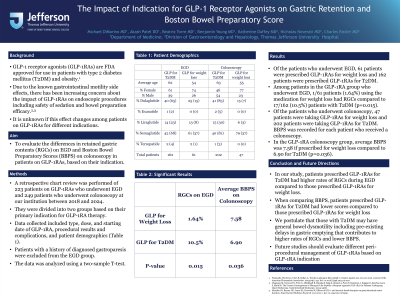Sunday Poster Session
Category: General Endoscopy
P0676 - Impact of GLP-1 Receptor Agonist Indication on Gastric Retention and Boston Bowel Preparatory Score
Sunday, October 27, 2024
3:30 PM - 7:00 PM ET
Location: Exhibit Hall E

Has Audio

Michael J. DiMarino, MD
Thomas Jefferson University Hospital
Philadelphia, PA
Presenting Author(s)
Michael J. DiMarino, MD1, Akash Patel, DO2, Beatriz Torre, MD3, Benjamin Young, MD2, Katherine Duffey, MD2, Nicholas Noverati, MD2, Charles Kistler, MD1
1Sidney Kimmel Medical College at Thomas Jefferson University, Philadelphia, PA; 2Thomas Jefferson University Hospital, Philadelphia, PA; 3Thomas Jefferson University, Philadelphia, PA
Introduction: GLP-1 receptor agonists (GLP-1RAs) are FDA approved for use in patients with type 2 diabetes mellitus (T2DM) and obesity. Due to the known gastrointestinal motility side effects, there has been increasing concern about the impact of GLP-1RAs on endoscopic procedures including safety of sedation and bowel preparation efficacy. It is unknown if this effect changes among patients on GLP-1RAs for different indications. This study aims to evaluate the impact of GLP-1RA indications on both EGD and colonoscopy preparations.
Methods: A retrospective chart review was performed of 223 patients on GLP-1RAs who underwent EGD and 249 patients who underwent colonoscopy at our institution between 2018 and 2024. They were divided into two groups based on their primary indication for GLP-1RA therapy: T2DM vs weight loss. Data collected included type, dose, and starting date of GLP-1RA, procedural results and complications, and patient demographics (Table 1). Patients with a history of diagnosed gastroparesis were excluded from the EGD group. The data was analyzed using a two-sample T-test.
Results: Of the patients who underwent EGD, 61 patients were prescribed GLP-1RAs for weight loss and 162 patients were prescribed GLP-1RAs for T2DM. Among patients in the GLP-1RA group who underwent EGD, 1/61 patients (1.64%) using the medication for weight loss had gastric content retained compared to 17/162 (10.5%) patients with T2DM (p=0.015). Of the patients who underwent colonoscopy, 47 patients were taking GLP-1RAs for weight loss and 202 patients were taking GLP-1RAs for T2DM. BBPS was recorded for each patient who received a colonoscopy. In the GLP-1RA colonoscopy group, average BPPS was 7.58 if prescribed for weight loss compared to 6.90 for T2DM (p=0.036).
Discussion: In our study, patients prescribed GLP-1RAs for weight loss had gastric content retained on EGD at a significantly lower rate than patients prescribed GLP-1RAs for T2DM. When comparing colonoscopy results, patients prescribed GLP-1RAs for weight loss had a significantly higher BPPS score than patients prescribed GLP-1RAs for T2DM. We postulate that those with T2DM may have general bowel dysmotility including pre-existing delays in gastric emptying that contributes to increased gastric retention and lower BBPS. Further areas of study include addressing cofounding factors such as weight, other comorbid conditions, and length of time off the prescribed GLP-1RA prior to procedure time.
Note: The table for this abstract can be viewed in the ePoster Gallery section of the ACG 2024 ePoster Site or in The American Journal of Gastroenterology's abstract supplement issue, both of which will be available starting October 27, 2024.
Disclosures:
Michael J. DiMarino, MD1, Akash Patel, DO2, Beatriz Torre, MD3, Benjamin Young, MD2, Katherine Duffey, MD2, Nicholas Noverati, MD2, Charles Kistler, MD1. P0676 - Impact of GLP-1 Receptor Agonist Indication on Gastric Retention and Boston Bowel Preparatory Score, ACG 2024 Annual Scientific Meeting Abstracts. Philadelphia, PA: American College of Gastroenterology.
1Sidney Kimmel Medical College at Thomas Jefferson University, Philadelphia, PA; 2Thomas Jefferson University Hospital, Philadelphia, PA; 3Thomas Jefferson University, Philadelphia, PA
Introduction: GLP-1 receptor agonists (GLP-1RAs) are FDA approved for use in patients with type 2 diabetes mellitus (T2DM) and obesity. Due to the known gastrointestinal motility side effects, there has been increasing concern about the impact of GLP-1RAs on endoscopic procedures including safety of sedation and bowel preparation efficacy. It is unknown if this effect changes among patients on GLP-1RAs for different indications. This study aims to evaluate the impact of GLP-1RA indications on both EGD and colonoscopy preparations.
Methods: A retrospective chart review was performed of 223 patients on GLP-1RAs who underwent EGD and 249 patients who underwent colonoscopy at our institution between 2018 and 2024. They were divided into two groups based on their primary indication for GLP-1RA therapy: T2DM vs weight loss. Data collected included type, dose, and starting date of GLP-1RA, procedural results and complications, and patient demographics (Table 1). Patients with a history of diagnosed gastroparesis were excluded from the EGD group. The data was analyzed using a two-sample T-test.
Results: Of the patients who underwent EGD, 61 patients were prescribed GLP-1RAs for weight loss and 162 patients were prescribed GLP-1RAs for T2DM. Among patients in the GLP-1RA group who underwent EGD, 1/61 patients (1.64%) using the medication for weight loss had gastric content retained compared to 17/162 (10.5%) patients with T2DM (p=0.015). Of the patients who underwent colonoscopy, 47 patients were taking GLP-1RAs for weight loss and 202 patients were taking GLP-1RAs for T2DM. BBPS was recorded for each patient who received a colonoscopy. In the GLP-1RA colonoscopy group, average BPPS was 7.58 if prescribed for weight loss compared to 6.90 for T2DM (p=0.036).
Discussion: In our study, patients prescribed GLP-1RAs for weight loss had gastric content retained on EGD at a significantly lower rate than patients prescribed GLP-1RAs for T2DM. When comparing colonoscopy results, patients prescribed GLP-1RAs for weight loss had a significantly higher BPPS score than patients prescribed GLP-1RAs for T2DM. We postulate that those with T2DM may have general bowel dysmotility including pre-existing delays in gastric emptying that contributes to increased gastric retention and lower BBPS. Further areas of study include addressing cofounding factors such as weight, other comorbid conditions, and length of time off the prescribed GLP-1RA prior to procedure time.
Note: The table for this abstract can be viewed in the ePoster Gallery section of the ACG 2024 ePoster Site or in The American Journal of Gastroenterology's abstract supplement issue, both of which will be available starting October 27, 2024.
Disclosures:
Michael DiMarino indicated no relevant financial relationships.
Akash Patel indicated no relevant financial relationships.
Beatriz Torre indicated no relevant financial relationships.
Benjamin Young indicated no relevant financial relationships.
Katherine Duffey indicated no relevant financial relationships.
Nicholas Noverati indicated no relevant financial relationships.
Charles Kistler indicated no relevant financial relationships.
Michael J. DiMarino, MD1, Akash Patel, DO2, Beatriz Torre, MD3, Benjamin Young, MD2, Katherine Duffey, MD2, Nicholas Noverati, MD2, Charles Kistler, MD1. P0676 - Impact of GLP-1 Receptor Agonist Indication on Gastric Retention and Boston Bowel Preparatory Score, ACG 2024 Annual Scientific Meeting Abstracts. Philadelphia, PA: American College of Gastroenterology.
